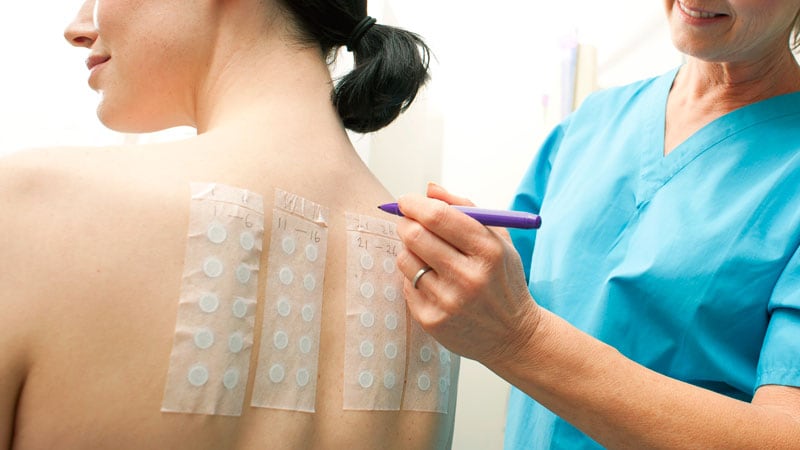[ad_1]
Individuals on immunosuppressants should discontinue them prior to patch testing, if at all possible, to avoid tarnishing the test results, according to updated guidelines from the North American Contact Dermatitis Group.
Patch testing can still be performed if medications cannot be suspended, but clinicians must be aware of the impact of the medications on the patch test results, wrote the authors, Mykayla Sandler, of Harvard Medical School, Boston, and colleagues.
Previous guidelines on this topic were published more than a decade ago, so an update was due, said corresponding author JiaDe Yu, MD, of the Department of Dermatology at Massachusetts General Hospital and Harvard Medical School, both in Boston, in an interview. Since the previous update, numerous biologics have become available for the treatment of atopic dermatitis, he said.
In the update, published in Journal of the American Academy of Dermatology, the authors outlined the recommended times for holding immunosuppressant medications prior to patch testing and the maximum recommended doses for medications if clinicians and patients choose to continue them prior to patch testing.
Overall, the guidelines recommend holding both topical and systemic immunosuppressants for a washout period prior to patch testing.
For topicals, the experts recommend holding low- to mid-potency corticosteroids, calcineurin inhibitors, Janus kinase (JAK) inhibitors, and phosphodiesterase 4 inhibitors for 7 days in advance of patch testing; 14 days is recommended for high-potency topical corticosteroids. The guidelines also recommend holding ultraviolet B phototherapy for 7 days and avoiding intramuscular corticosteroids for 30 days in advance of patch testing.
Patients on antihistamines and biologics for psoriasis need not discontinue them, according the guidelines. However, systemic biologics for atopic dermatitis should be held for 14 days, if possible, and systemic corticosteroids, methotrexate, azathioprine, cyclosporine, mycophenolate mofetil, and oral JAK inhibitors should be suspended for 14 days.
If patients must continue taking medications, the authors said, they should be counseled about the risk for false negatives and the need for repeat testing. They offered maximum recommended daily doses for systemic corticosteroids for 7 days prior to patch testing, including 10 mg/d or less for systemic corticosteroids. Although patch testing can be performed in patients on biologics for atopic dermatitis and on oral JAK inhibitors, these medications may affect the results with some or most allergens, respectively, the authors noted.
Clinical Considerations
When deciding whether patients should suspend immunosuppressants, challenges include determining whether they will flare all over, Yu told Medscape Medical News. “Patch testing requires areas of clear skin, ideally on the back,” he said. “Some patients are on immunosuppressants to treat their underlying dermatitis. If they are flaring all over on the day of patch testing, it’s impossible to do the testing,” he added. Therefore, sometimes a balance is needed between having patients on a small bit of immunosuppression, but not so much as to prevent a positive reaction, if there is one, from occurring, he said.
“If patients continue to flare in a pattern that is suggestive of allergic contact dermatitis, then repeat patch testing should be considered,” Yu said. Other factors, such as an angry back reaction where all the allergens flare, nonadhesion, or an irregular reading timeframe also may warrant repeat testing, he said.
Looking ahead, outcomes research is greatly needed, especially with the newer biologics, Yu emphasized. Outcomes data on biologics other than dupilumab, especially JAK inhibitors, are very limited, although the use of JAK inhibitors is expanding, he noted. The current guidelines represent expert consensus and are based on experience and opinions; objective evidence is always best, he said.
Balancing Risks and Benefits
Patch testing is crucial in evaluating patients with recalcitrant dermatitis, said dermatologist Matthew Zirwas, MD, who practices in Bexley, Ohio, in an interview.
“However, clinicians are faced with a challenge when working with such a patient; treat first and only patch test if treatment doesn’t work, or patch test first and only treat if patch testing doesn’t lead to resolution,” he said. In practice, clinicians may initiate treatment for presumed atopic dermatitis and refer for patch testing to rule out a component of allergic contact dermatitis, Zirwas said. The challenge then becomes whether to continue the dermatitis treatment during patch testing or discontinue treatment to get an accurate patch test result, he noted.
“These guidelines attempt to answer this question and do so effectively, in my opinion,” Zirwas told Medscape Medical News. “The easy answer is that, in an ideal world, we’d discontinue everything for at least a month before patch testing; however, this would lead to severe discomfort in many patients due to disease flares, and in some, the dermatitis flares would be so bad as to make patch testing impossible,” he said.
Zirwas offered another simple approach to interpreting the guidelines. If patients still have persistent dermatitis caused by contact dermatitis, whatever they are taking is not suppressing the contact dermatitis and they can be patch tested without stopping it, he said. By contrast, “if their dermatitis is clear on therapy, if the dermatitis was caused by contact dermatitis, the therapy is suppressing it and patch testing on the current therapy is likely to be inaccurate,” he explained.
The guidelines are most important when deciding how much to reduce therapy and for how long before patch testing, Zirwas said.
The update received no outside funding. Yu disclosed serving as a consultant/advisory board member/investigator for AbbVie, Arcutis, Astria, Dermavant, iRhythm, Leo, Lilly, National Eczema Association, O’Glacee, Pfizer, Sanofi, SmartPractice, and Sol-Gel and receiving an honorarium from UpToDate. Zirwas disclosed serving as a speaker or consultant for AbbVie, Arcutis, Dermavant, Galderma, Incyte, Leo, Lilly, Pfizer, and Sanofi/Regeneron.
[ad_2]
Source link : https://www.medscape.com/viewarticle/pause-immunosuppressants-prior-patch-testing-if-possible-2025a10003nd?src=rss
Author :
Publish date : 2025-02-12 12:25:46
Copyright for syndicated content belongs to the linked Source.
